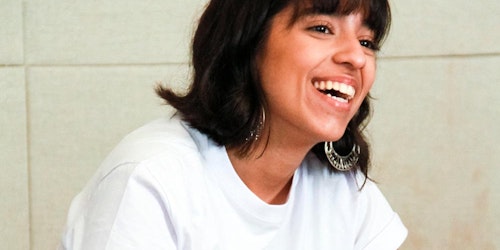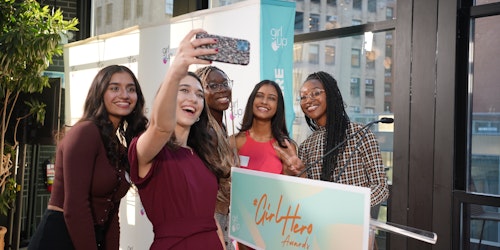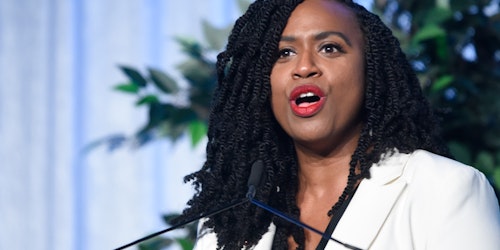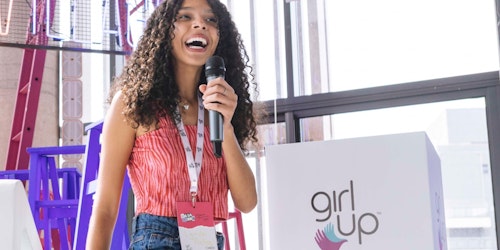Storytelling is one of the most powerful tools when you are trying to create change in the world. It is not only the story, but how you tell that story that really shifts mindsets. We’re now in the era of really understanding that power, and the film industry plays a critical role in this.
At Girl Up, we’re really trying to encourage young girls to find their inner power because it’s not about giving them power–they already have that. They just need to be encouraged to use that power. Seeing real-life examples like award-winning director, screenwriter, and producer Laura Terruso is crucial when trying to achieve that.
Less than a decade out of film school, Laura has already directed four feature films, including teen Netflix hit “Work It” and her new comedy, “About My Father”. With this project, Laura made history as the youngest woman ever to direct Hollywood veteran Robert De Niro. But she’s looking forward to the day when thousands of other young women will forge a path in the film industry and continue to break records.
Hot off the release of her new movie, I chatted with Laura about the lessons she’s learned in the industry, the power of diverse storytelling, and the need for more young women to share their stories on screen.
“About My Father”, which is your latest movie, is based on the life of Sebastian Maniscalco, who is also the screenwriter and lead character of the film! It must be so interesting to work with him. What was it like working with him to create this movie? And how did you collaborate on bringing his story to life, to the big screen?
It was wonderful. Sebastian is a brilliant comic and a really talented actor. I think part of what attracted us to each other for this particular project was that we have a shared history. His father is from Sicily, and this movie is all about his relationship with his dad. My mother is from Sicily, and she emigrated at about the same time. So, when I pitched on the film, I knew I had to direct this movie because I understood this world. And [I understood] this kid, these characters so much. There was such a commonality between us in a shared language and a shared culture. The film is such a celebration of family, and Italian families especially, so it was a real delight to work with him on this project.
It sounds amazing! You mentioned that the film is about family and identity, which are definitely relatable topics for an audience. What do you think the audience can learn from these themes and how do you hope the overall film will resonate with the viewers?
All of my films are heartfelt comedies. They are the kinds of films that make you laugh throughout–and then cry at the end–because ultimately, they’re all about relationships. The parent-child relationship is the most primal relationship there is. In this film, we were looking at how everyone gets frustrated with their parents, everyone finds their parents embarrassing at times. Yet, we love them so much. So, this is really Sebastian’s love letter to his father, it’s my love letter to my mother, and it was so special to be able to make a film that is so universal while also still being so personal.
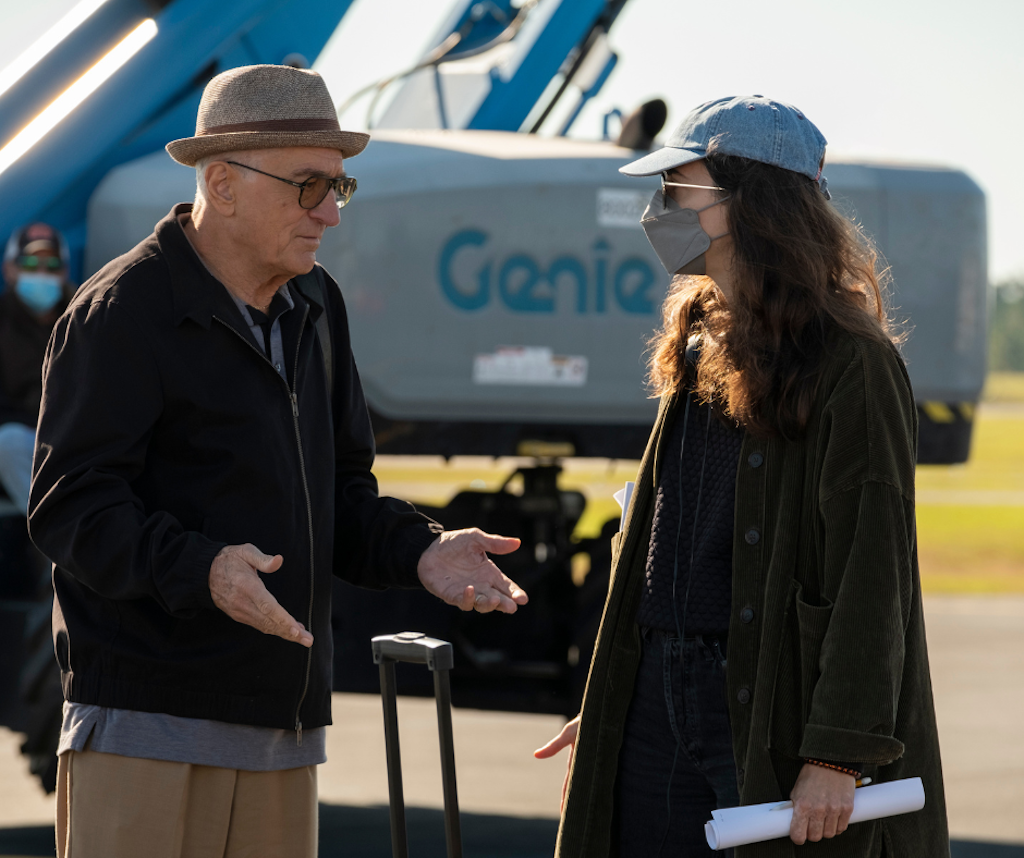
There was a trend recently where people try to not laugh at the jokes women make to show that they don’t find women funny. But this film proves them wrong; you prove them wrong! How did you approach the comedic elements of the film and what do you think are the most important ingredients for a successful comedy?
I think of comedy as the juxtaposition of opposites. You are pairing these families that, in the case of this film, are just like oil and water and there’s something so fun about that. Whenever I look at a screenplay or have an idea for a film, I think about the juxtaposition of opposites and how I can further bring them out. So much of comedy is character and this movie is a very character-based comedy. It’s not that the jokes are at the expense of other people. There are such different people with such different values and kinds of worlds that the comedy just inherently comes from that.
We need to hear your stories now more than ever, because there are so many stories that haven’t been told that really need to be told.
At Girl Up, we really value the power of girls and young women. Could you please talk about the challenges you had to overcome being a female director in a predominantly male industry? What do you think are the most pressing issues facing women in the movie industry today? And, maybe even more importantly, how can these issues be addressed?
I’m really passionate about more young women taking up the banner, being directors, telling their stories. We need you. We need more young women to say “I want to be a director when I grow up.” I didn’t come from a film family. I didn’t know anyone who worked in films. It just didn’t feel like a possibility. I think that ties into our biggest challenge: Perception. People have a certain idea of what they think a director looks like. Usually, it’s a white man with a baseball hat and a big megaphone. (laughs) We really need to challenge that perception. I encourage the young women reading this and the young women who saw and loved my film “Work It” that if you want to make films, if you want to tell stories, you can. We are in a moment right now where you have female directors that you can look to, who can be an example of a life that you can lead. We need to hear your stories now more than ever because there are so many stories that haven’t been told that really need to be told.
As you just mentioned, you also directed the hit Netflix film “Work It”, produced by Alicia Keys and starring Sabrina Carpenter, Jordan Fisher, and Liza Koshy. It has such a diverse and inclusive cast with a strong female lead. How do you see films like these contributing to the conversation? What message do you hope it sends to women and girls all across the globe?
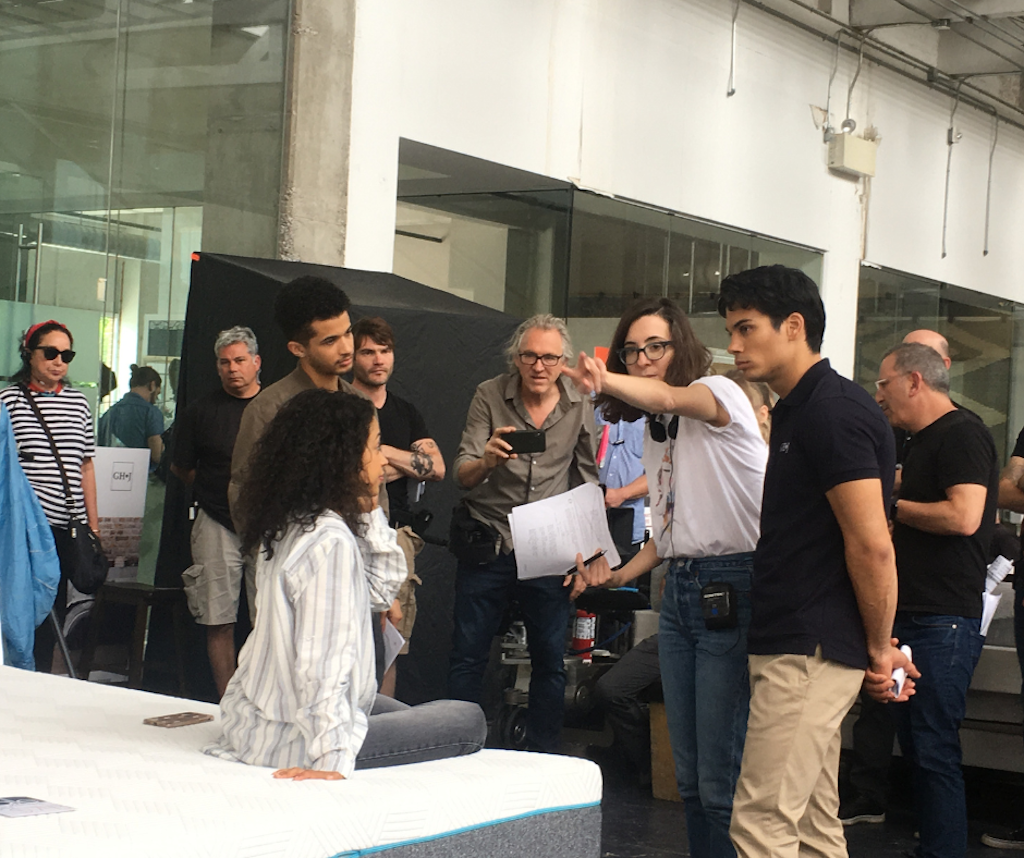
That film is really about being true to yourself. I think that the ultimate message in all teen movies is, in some way, “to thine own self be true.” It’s the most important lesson I think any of us can learn in life and that’s why it’s such a common theme in films. With “Work It”, we just had so much fun–and you can feel it when you watch it. I was really fortunate to work with Netflix, which was so supportive of having a diverse cast. So many Hollywood films don’t reflect our world, and I want my films to feel authentic and true to our experience. That’s the world I grew up in, that’s the world I want to live in, and that’s the world I’m going to put on screen.
I want my films to feel authentic and true to our experience. That’s the world I grew up in, that’s the world I want to live in, and that’s the world I’m going to put on screen.
Social norms can be created and disrupted through media and movies are maybe the most influential type of media. Do you have any ideas on what are some of the steps the film industry can take to ensure that we continue to promote diversity and inclusivity?
We have a long way to go until we get to parity. Out of the top 250 grossing films in 2021, only 17% of the directors were female. Again, this all falls back to perception to young women taking up the craft. With digital media, there’s been a democratization of storytelling where people can pick up their phones, make a video, and it can go viral. Young filmmakers are experimenting all the time using their phones as cameras and we’re seeing this shift in how films are made. I’m excited about the future because I think technology is at a place where new voices can really break through, inspire, and ignite a whole new kind of cinema. But decision-makers in Hollywood–and beyond–need to give themselves mandates in parity in the people they hire. It’s the only way it’s going to change. It will likely take a generation or two for us to reach that parity, but that’s why it’s so important for young women like you who are interested in storytelling to start now.
What advice would you give to aspiring female filmmakers who are trying to break into the movie industry?
When I was starting out, I worked on film sets in every capacity possible. I’m lucky that I grew up in New York–where there’s a huge independent film scene–so I was able to work as an assistant director, a producer, a gaffer, a grip, and a sound person. Having all those experiences in different roles made me prepared for life as a director and it made me a better director. I was able to observe what worked and what didn’t. I learned so much in those first few years working in the film industry. If you have an opportunity to work on a film set, such as a production assistant, take that opportunity and learn as much as you can. When you’re in that role, ask the people you admire how they got to where they are. If you really work hard and show how much you care, you’ll be recognized and it will help you in the future. You’re also just going to learn so much by being there. So, just say “yes” to every opportunity. Even if you want to be a director, say “yes” to the other stuff, because it’s going to make you a better director in the long run.
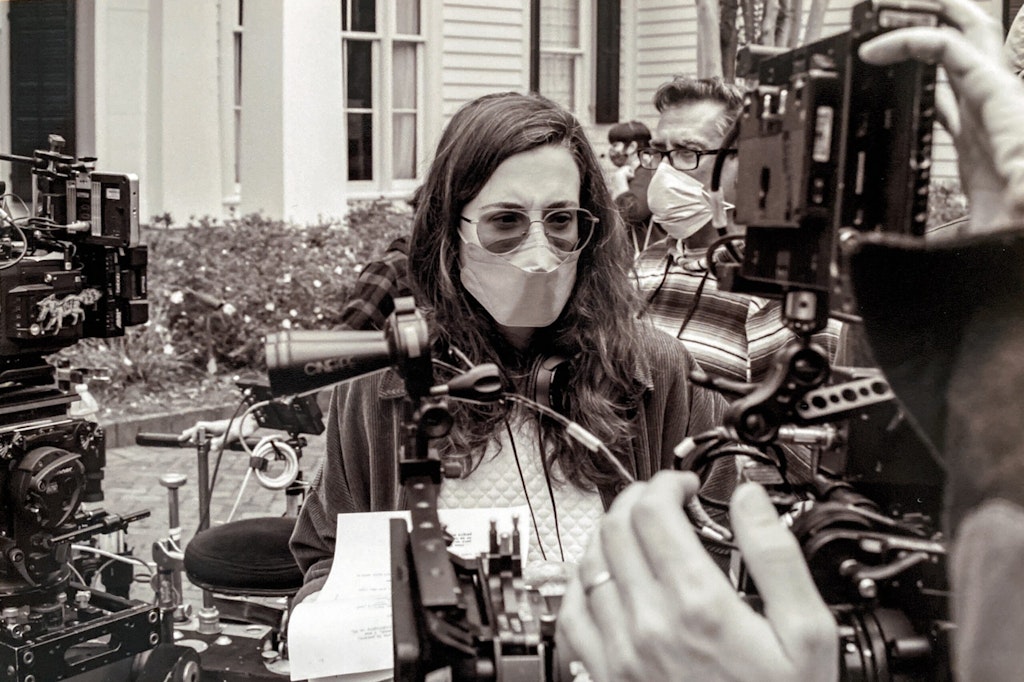
As you said, experimenting really helps. Maybe you think you want to be a certain thing, but through these experiences, you realize you want to try something else.
Absolutely. I have so many examples from film school where a lot of my classmates went in wanting to be writers or directors, and then they discovered that they were incredible cinematographers and now are some of the top working cinematographers in the world! So, be open to the universe helping you find your place. Don’t get fixated on one thing.
I’m excited about the future because I think technology is at a place where new voices can really break through, inspire, and ignite a whole new kind of cinema.
What is your motto and/or goal as a writer and director?
That’s a tough one to sum up. (laughs) I make comedies so my goal is always to make people laugh. I think of film as an empathy machine. It’s a way to help us be in someone else’s shoes, and see the world the way they see. There’s such a power that comes with that. It’s a real tool for change and I don’t take that lightly. I want the films I make to reflect the world that I want to see as well as the world we live in. They should have authenticity, but they should also feel aspirational in some way.
This interview has been edited for length and clarity.
Watch this space for more conversations with the world’s most influential female changemakers as part of our ongoing “In Conversation With” blog series!



